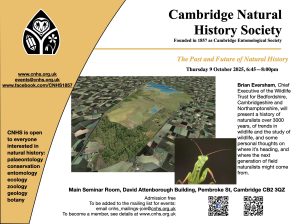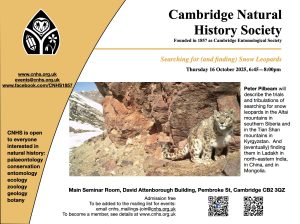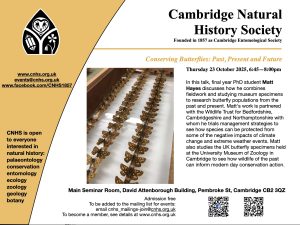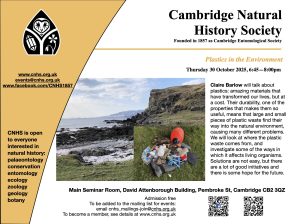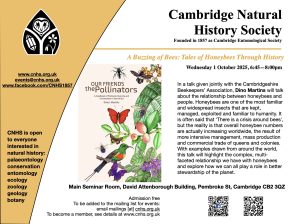The first talk in the CNHS spring programme is on 23rd January 2025, when Ed Turner will talk on “Insect conservation: conserving the little things that run the world”.
Ed is Curator of Insects in the Museum of Zoology in Cambridge and Professor of Insect Ecology. He will present the growing evidence that insect numbers are declining in many areas, with serious implications for global biodiversity and ecosystem processes. Drawing on work from the Insect Ecology Group in Cambridge, this talk will discuss some of the evidence behind these declines, why this might be, and what we can do about it.
The talk will be held in the David Attenborough Building, Pembroke Street, Cambridge CB2 3QZ. It will start punctually at 6:45 p.m. with tea/coffee available beforehand. ALL WELCOME, ADMISSION FREE.
The talk will also be available via Zoom. Details will be sent to those on the CNHS mailing list – email CNHS_mailings-join@cnhs.org.uk to be added to the list.
Future talks
These will all be held at 6:45 p.m. in the David Attenborough Building, except for 20th March which will start at 6:30 p.m. with the CNHS AGM.
30th January The marine world Frances Dipper
6th February Alice Hibbert-Ware: Nature Study and the Little Owl Food Enquiry (1936-7) Max Long
13th February Squirrels of the British Isles: Red, Grey, and Black! Helen McRobie
20th February Great Fen: Progress on the peat Henry Stanier
27th February CNHS field studies 2024 Duncan Mackay and Jonathan Shanklin
6th March History of forests Charles Turner
13th March The Cambridgeshire Bird Club – 1925 to 2025: A century of bird watching Bob Jarman
20th March Natural materials for musical instruments Jim Woodhouse. This talk will be preceded by the CNHS AGM at 6:30 p.m.





